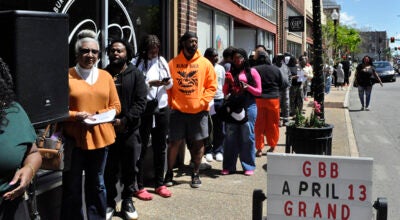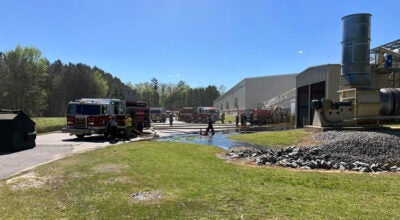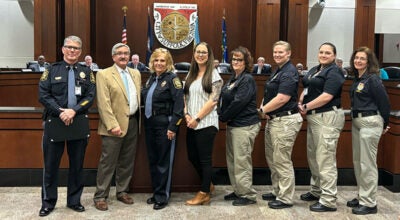Report: Suffolk Police needs more officers
Published 10:14 pm Wednesday, March 6, 2019
Suffolk Police Chief Thomas Bennett said Wednesday he needs 10 more officers and he plans to alter police zones in order to handle increased call volumes, especially in the College Drive area of North Suffolk.
Bennett, along with criminal justice management consultant Peter Bellmio, presented a department staffing study to Suffolk City Council during its work session.
Though the report focused on data from 2017, Bennett, in responding to a question from Councilman Tim Johnson, outlined call volumes through 2018 and said if anything, the need is greater as a result.
Bennett said that resident-initiated calls for service have increased about 14 percent, from 42,875 in 2014 to 48,866 in 2018, with the busiest times around 11 a.m. to 5 p.m., and with weekdays being busier than weekends.
“I’m a little bit surprised looking at the numbers,” said Mayor Linda T. Johnson. “I’m surprised that it isn’t later in the day versus the middle of the day.”
Bennett noted that in other cities in South Hampton Roads, the call volume tends to increase more after 7 p.m.
“We’ve got an afternoon peak, which has always told me it’s accidents and not shootings, rapes and very serious crime,” Bennett said. “So I’ve always looked at that … as a good thing here in Suffolk.”
The top dispatched calls for service in 2017 were mainly low-level Priority 3 calls from residents, with 4,566 of those, with medium-level Priority 2 alarm calls ranking second at 3,116. The most Priority 1 calls came for assisting medical units. The majority of calls for things like suspicious persons, car accidents, disturbances and reckless driving are ranked as Priority 2 calls.
Bennett said the department is currently meeting goals for responding to calls — 6 minutes for Priority 1, 15 minutes for Priority 2 and 30 minutes for Priority 3.
Of the 10 officers, he wants to put six of them in Precinct 2, in the northern part of the city, and three more in the downtown area of Precinct 1. He would also assign a sergeant to Precinct 2.
Bennett said he’s looking at reducing the number of patrol zones from 18 to 17 and also shifting zones out of downtown.
Currently, there are six patrol zones in the northern end of the city and 10 elsewhere. Bennett said he projects an addition of a patrol zone to the northern end, and reducing by two the downtown patrol zones. He said he wants to have geographically-adjusted zones to equalize the demand for service.
“This is the biggest thing we’ve done in years,” Bennett said.
The report also recommended making better use of patrol officers’ time, changing dispatching practices to put true emergencies first and establishing a quality control system for patrol management data.
He’s also looking at overlapping shifts to have more officers on duty at peak times.
Bennett said he also wants to reduce the need to cross-dispatch calls. In those instances, if officers from one zone are tied up, officers from another zone will be dispatched to the call. However, once the call is complete, the officers coming from outside the zone get sent back to their regular zone.
Bennett said that is not an efficient way to handle calls and wants to minimize that except in critical situations.
Bennett also wants to add two supervisors to the 911 Communications Center and make adjustments there. Currently, there are 23 call takers/dispatchers and three supervisors. What’s needed, he said, are eight dedicated call takers, 15 dedicated dispatchers and five supervisors.
The Communications Center received 140,225 calls in 2017 — 50,608 emergencies and 89,617 non-emergencies. The majority of 911 calls come from about 9 a.m. through 8 p.m., and non-emergency calls peak from about 9 a.m. through 5 p.m., The Communications Center averages about 139 emergency calls per day, and staff there spend an average of 1 minute and 50 seconds on the phone per call. Non-emergency calls average 246 per day, with an average talk time of 1 minute, 28 seconds.
Bennett recommended modifying the Communications Center’s automated attendant program to make it more effective in diverting non-emergency calls from coming in there. He also wants to adopt new minimum staffing levels and better define the role of supervisors in the center.
Councilman Roger Fawcett called the information eye-opening, and said he would do what he could to support the police department.
Bennett said he would likely have additional staffing needs in the coming years.
“Is this going to hold us for the next 10 years?” he queried. “No.”





